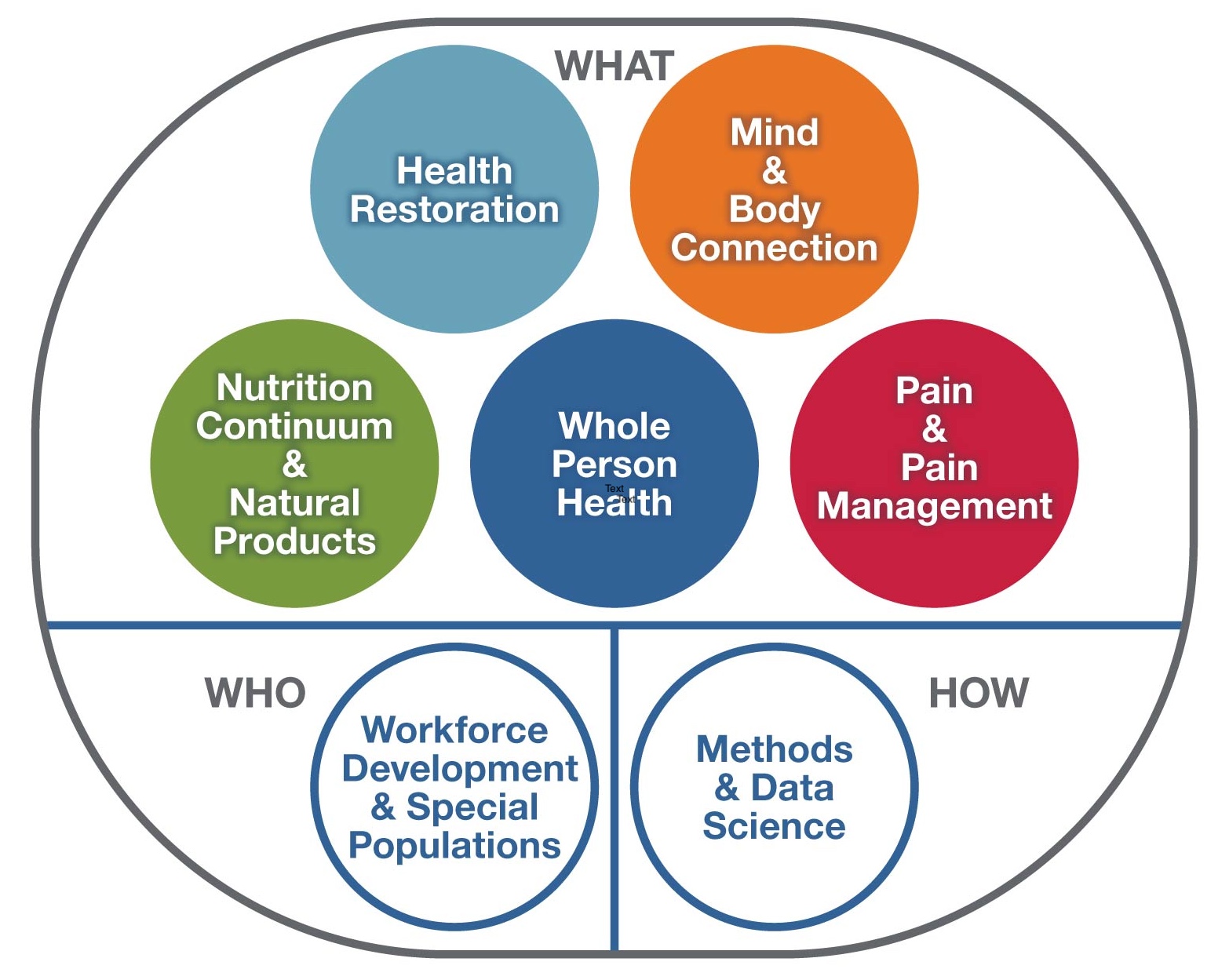Looking to the Past and Future in NCCIH’s 25th Anniversary Year
Director’s Page
Helene M. Langevin, M.D.
January 24, 2024
Each year at this time, I like to look forward to the coming year at the National Center for Complementary and Integrative Health (NCCIH) and review the year that just ended. This type of reflection is particularly appropriate now because 2024 is NCCIH’s 25th anniversary year—a great time to celebrate progress in integrative health research and consider directions for the future.
NCCIH’s research interests fall within seven main themes, with whole person health—the fundamental concept underlying our current strategic plan—at the center. As we start the new year, let’s look at recent activities and future plans in each of these areas:

- I discussed Whole Person Health at major meetings in 2023, including the 2nd World Congress Integrative Medicine and Health and the 3rd International Danube Symposium, and in an interview in the Journal of Nuclear Medicine and an article in Global Forum. We will explore this focus area again at the International Congress on Integrative Medicine and Health (ICIMH) in April, with sessions on new strategies and methodologies for whole person research and on leveraging National Institutes of Health (NIH) open access repositories to advance research in this field. Our Request for Information on key determinants of whole person health was very successful, and we’re incorporating the input we received into a set of whole person health common data elements for use in research, portfolio analyses, and potentially in patient care.
- NCCIH has long been active in research on Pain and Pain Management, particularly within the Helping to End Addiction Long-term® Initiative, or NIH HEAL Initiative®. With our NIH HEAL Initiative partners, we held a successful workshop on whole joint health in July 2023, and we will soon fund new research on biomarkers of myofascial tissues for pain management. We’re also participating in NIH HEAL Initiative funding opportunities for research to increase implementation of substance use preventive services and the development of nonaddictive treatments for pain.
- 2023 was an eventful year in our Mind and Body Connection focus area. Working with partners within and beyond NIH, we began the year by publishing the NIH Music-Based Intervention Toolkit for research on brain disorders of aging and ended it by leading a 2-day workshop on Music as Medicine: The Science and Clinical Practice. Another highlight of the year was the 2nd Annual NIH Investigator Meeting for Interoception Research. In addition, we and NIH partners are currently supporting six active research networks on emotional well-being. We’ll also look at emotional well-being at ICIMH in April, in a session on how advancing the science in this area can improve whole person health.
- Health Restoration is another important theme, which was beautifully illustrated by Dr. Ahmed Tawakol as he shared his insights on heart-brain interactions and neurobiological resilience in his 2023 Straus Distinguished Lecture. I’m also excited about the ongoing work of the NIH Common Fund’s Bridge to Artificial Intelligence (Bridge2AI) program, which includes a data generation project on salutogenesis—the process of healing and restoring health.
- In the area of Nutrition Continuum and Natural Products, we are addressing the unique challenges experienced by researchers studying the potential therapeutic benefits of cannabis and its constituents by creating a web resource on NIH-supported cannabis research and issuing a funding opportunity for a resource center to support investigators working in this field.
- Because scientific progress depends on the people who do the research and the resources available to them, Workforce Development and Special Populations is a crucial theme for NCCIH. 2023 saw the launch of the NCCIH-funded RAND Research Across Complementary and Integrative Health Institutions (REACH) Center, which will build research capacity through collaborations between RAND’s extensive research infrastructure and institutions that educate complementary and integrative health practitioners. We also support research training and career development opportunities for scientists at all career stages from undergraduate to faculty, and we are participating in a funding opportunity on excellence in diversity mentorship.
- Methods and Data Science are important in advancing research on integrative and whole person health. In 2023, we funded an open-access repository and database for anatomical and physiological correlates of acupoints. And we’re currently participating in a funding opportunity on rigorous methods of behavior measurement.
People sometimes ask how a small Center like NCCIH can be involved in so many projects. The key is that we don’t work alone. Many of our activities involve collaborations with other components of NIH or other Federal agencies. For example, the emotional well-being research networks are supported by the National Institute on Aging and the Eunice Kennedy Shriver National Institute of Child Health and Human Development as well as NCCIH, and one of our major initiatives on pain, the Pain Management Collaboratory, is a partnership with the Department of Defense and Department of Veterans Affairs as well as several components of NIH. We will continue to seek out partnerships so we can learn from one another and combine resources to reach shared goals.
2024 will be an exciting year for NCCIH as we celebrate our 25th anniversary and begin to develop our next 5-year strategic plan. We’ll reflect on the past and look to the future as we build on NCCIH’s strengths and move in new directions. I hope you’ll continue to follow our journey.
